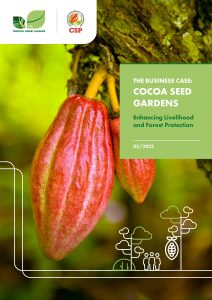Indonesian cocoa sustainability in terms of increased productivity, improved farmer livelihoods, secure supply chains, and environmental preservation is an ongoing struggle.
The social, economic, and environmental implications cannot be separated one from another.
A major pressing need is for availability of quality planting material for farmers in order to increase productivity and optimize land use. Seed gardens are important to feed quality certified rootstock into cocoa nurseries for distribution of seedlings for replanting. Sulawesi, the largest cocoa-producing area of Indonesia, currently contains no certified cocoa seed gardens, creating a barrier to increased productivity for aging cocoa farms.
There are clear overlapping interests between cocoa stakeholders and non-profit stakeholders, particularly those concerned with deforestation. Cocoa is a shade crop and lends well to agroforestry models. The optimization of land use through replanting presents one of the greatest opportunities to disincentivize deforestation in smallholder farming communities. An analysis of the situation reveals the benefits of local seed garden establishment to a variety of stakeholder– government, private sector, non-profit sector, and smallholder farmers. The seed garden business case for farmers is profitable with minimum risk. The seed garden business case for the private sector is contingent upon calculation of indirect profitability related to supply chain improvement. Local seed garden establishment contributed to government and non-profit objectives.
A multi-stakeholder approach to localized seed garden establishment is preferrable, with each party weighing respective investment and return from both monetary and non-monetary perspectives. This document outlines the broad justification for such a collaboration to be initiated, driven by Cocoa Sustainability Partnership (CSP) and one or more of its private sector members located in Sulawesi, bolstered by support from central and regional Indonesian government departments and the non-profit sector.
